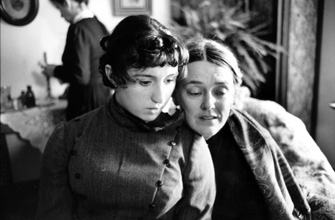Mariages
Hochzeiten
Marriages
Catherine Martin
Kanada 2001 |
| |
|
 |
|
|
Delphi
13.02., 19.00
Arsenal 1
14.02., 12.30
CinemaxX 3
14.02., 18.15
Babylon
15.02., 22.00
|
|
|
|
|
Produktion: Coop Vidéo de Montréal,
Productions 23
Weltvertrieb: Film Tonic, Joanne Senecal
5130, boulevard St.-Laurent, suite 400,
Montréal (Qc), H2T 1R8, Canada
Tel.: (1-514) 272 4425, Fax: 274 0214
e-mail: jsenecal@filmtonic.ca
Buch: Catherine Martin
Kamera: Jean-Claude Labrecque
Darsteller: Marie-Ève Bertrand, Guylaine
Tremblay, Mirianne Brûlé, Hélène Loiselle,
Markita Boies
Format: 35 mm, 1:1.85, Farbe
Länge: 95 Minuten, 24 Bilder/Sek.
Sprache: französisch |
|
|
|
|
Quebec am Ende des 19. Jahrhunderts. Die 20jährige Yvonne hat
ihr ganzes Leben noch vor sich, aber sie ist sich weder über ihre
Gefühle im Klaren, noch weiß sie, was sie mit ihrem Leben
anfangen soll. Sie ist hin und her gerissen zwischen ihren intensiven
Emotionen und der Liebe zur Natur sowie dem strengen
Verhaltenskodex der viktorianischen Epoche. Als Yvonne
Charles kennenlernt, verliebt sie sich Hals über Kopf in ihn. Die
Beiden fangen an, sich heimlich zu treffen. Doch Hélène,
ihre
Schwester, hat andere Pläne mit ihr: Sie soll Nonne werden.
Charles hat sie als Ehemann für ihre eigene Tochter im Auge...
„Im Verlauf der Geschichte wird Yvonne sich ihrer Intuition und
ihrer Gefühle immer stärker bewusst. Sie entdeckt, dass in ihr
ein Verlangen lebt, das sie nicht verleugnen kann. Ohne
Vorbehalte öffnet sie sich der Liebe. Hélène dagegen
handelt
zweckgerichtet und im Sinne ihrer persönlichen Interessen. Sie
ist eine Frau, die ihre Fähigkeit zur Liebe und Zuneigung vollkommen
unterdrückt hat. Sie verkörpert die Viktorianische
Epoche und deren Auswirkungen auf viele Generationen von
Quebecern.... In Mariages wollte ich das Unbeschreibliche
zeigen: die Sehnsucht, die in jeder jungen Frau lebt. Der Film
erzählt vor allem von Träumen und Metaphern. Er ist ein
Bekenntnis zum Glauben an die Liebe.“ Catherine Martin
|
| |
|
|
Quebec at the end of the 19th century.
Yvonne, twenty, has her whole life ahead of
her but she hasn’t yet sorted out her feelings
nor what exactly she wants to do. She
is torn between her intense emotions and
her love of nature on the one hand and the
austere code of Victorian era behaviour on
the other. Passion and strong sentiments
are to be kept under wraps. Yvonne has
been living with her older sister Hélène,
who is married to a notary with whom she
has five children. Hélène is a soft-spoken
woman who rules the household with authority.
When Yvonne meets Charles, a
client of her brother-in-law, she is smitten.
She and Charles begin seeing each other
surreptitiously. But Hélène has other plans
for her younger sister, in particular a religious
life. She has her sights set on Charles
as a husband for her own daughter...
“During the course of the story, Yvonne
learns to become more and more aware of
her intuition and feelings. She discovers
that desire resides within her and that she
cannot deny it. She forcefully opens herself
to love. And as for Hélène, she acts according
to purpose and personal interest.
But more than that, she’s a woman who has
totally repressed her capacity for love and
affection. Undemonstrative, she embodies
the Victorian era and how it impacted many
generations of Québecois ... In Marriages I
wanted to demonstrate the inexpressible:
the desire that lives within every young
woman. The film is above all a tale of
dreams and metaphors; in fact, it’s a confession
of faith in love.“ Catherine Martin
|
| |
|
Biographien / Biographies
Catherine Martin, geb. 1958 in Hull (Quebec). Film- und Fotostudium an der
Concordia-Universität in Montreal. Filme seit 1985, u.a. Nuits d’Afrique
(1990), L’Ombre (1992), Les Fins de Semaine (1995), Les Dames du 9e
(1998). Mariages ist ihr erster abendfüllender Spielfilm. |
